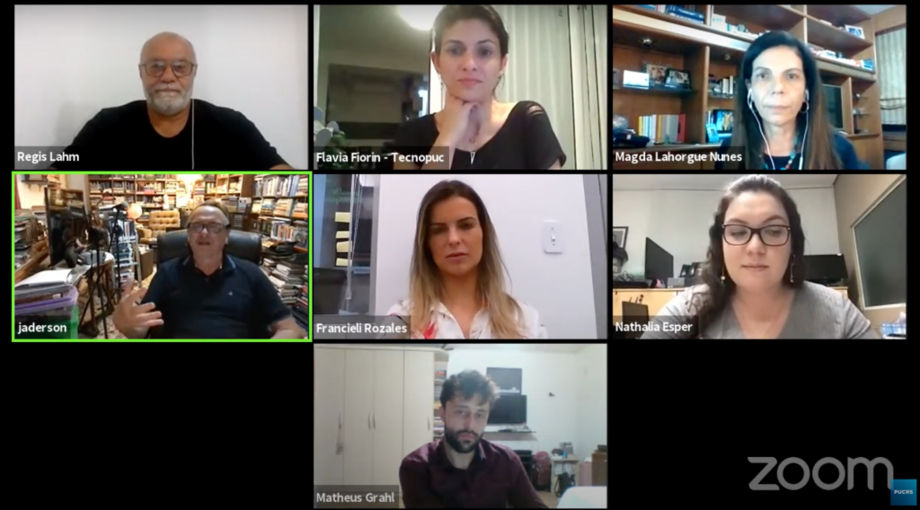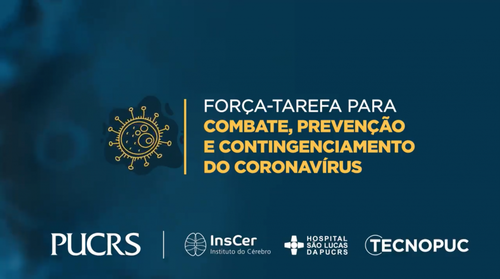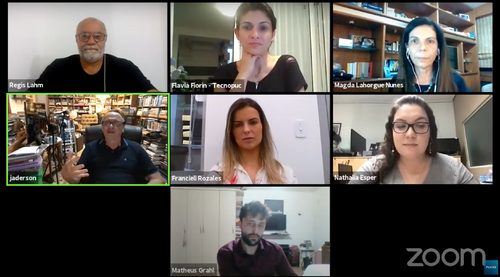Webinar presents results of task force groups against Covid-19
The webinar Task force for fighting, preventing and contingent on coronavirus: advances and perspectives presented the main results of the working groups that make up the task force and future perspectives in each of them.
The event, done online, started with a speech by the director of the Brain Institute of RS, Dr. Jaderson Costa da Costa, recalling the beginning of the year and the construction of the task force with professionals from different areas of expertise. The first group, Intelligence and Data , represented by Professor Régis Lahm, from the School of Humanities, presented the work developed. The group had two goals: to develop a Covid-19 self-diagnosis platform and to apply geospatial and artificial intelligence in health analytics. For the first purpose, the InCare platform was created, in partnership with DBServer, a company based in Tecnopuc. As for what was achieved, they indicated positive potential in their adoption in the Data Science Pipeline, Predictive Analysis and Visualization of Geospatial Data.
Then, representing two groups, Professor Franciéli Rozales, from the School of Health and Life Sciences, commented on the work of the teams. The second group developed the work on Molecular Experimental , with the objective of providing a rapid molecular diagnosis of the new coronavirus to support medical decisions, specifically from the São Lucas Hospital of PUCRS. The team, as an outcome, had validation and accreditation with the Central Laboratory of Public Health of RS - LACEN, and was able to attend large companies, publish scientific articles and produce a diagnostic methodology that became part of the portfolio of services offered by InsCer.
The third group took the Diagnosis , with the purpose of developing an innovative methodology for large-scale molecular testing of symptomatic and asymptomatic, focusing on the efficiency and reliability of molecular tests, considering cost reduction and agility in issuing results. Some of the results achieved were the integration between the School of Health and Life Sciences, InsCer and São Lucas Hospital of PUCRS, with emphasis on the rapid molecular diagnosis of Sars-CoV-2 in hospitalized patients, within 12 hours, and the flow of testing employees with suspected Covid-19 within 24 hours.
The next groups were presented by Flávia Fiorin, representative of the Superintendence of Innovation and Development of Tecnopuc and Inovapuc. The Labs Tecnopuc team had the purpose of supporting initiatives aimed at fighting the pandemic through the production of facial shields and supporting the development of projects and products, and succeeded, as a result, over approximately six months of integrated operation, registering more than 190 demands distributed on facial shields, supporting the development of projects and products. The Startup Ecosystem team had the purpose of giving visibility to initiatives undertaken by startups and other organizations that are part of the PUCRS innovation ecosystem in order to connect opportunities and expand the impacts of actions, in a way related to pandemic context. From March to September 2020, around 20 actions were taken by Tecnopuc's startups directly related to the effects of the pandemic, in addition to initiatives aimed at physical and mental health, service to the community and / or physical infrastructure and digital service support.
Subsequently, the deputy director of InsCer, Dr. Magda Lahorgue Nunes, commented on the Sono group and the Mental Health . The population-based study of the Sono group was carried out using an online platform and sleep assessment using questionnaires validated for Portuguese. Respondents were divided into adults, children aged 0-3 years and children aged 4-12 years. Around 55% of adults had significant changes in sleep quality in the seventh week of quarantine, in children aged 0-3 years the number reached around 50% and in children aged 4-12 years it was around 30% responses. According to the teacher, these are percentages of very significant changes. In the subjective impression part of the research, in which the person must explain in a short word or phrase what had caused sleep to lose its quality, the adults responded, mostly, anxiety and concern and, in the two age groups of the children, the fact that they are sleeping late and have their routine changed. The Mental Health group, which is coordinated by Dr. Rodrigo Grassi, was also presented by the deputy director of InsCer. The survey, which is still open, has already reached 18 thousand respondents from all over Brazil. In 58% of the responses, what most generated stress was social distance, followed by health issues, with 49.9% and economic issues, with 48.6%. Around 9% of respondents started using tranquilizers in the quarantine and 22.9% reported the desire to die, considering everything from thinking without a plan to attempting suicide.
The rapporteur of the Brain and Covid group and the Health and Artificial Intelligence group, Nathália Esper, engineer of computing and doctoral student at InsCer, spoke next. The Brain and Covid group aimed to investigate potential brain abnormalities in the field of brain function, structure and molecular. Bringing partial information, as the research is ongoing, the group entered into a research partnership with Hospital Conceição, making the project now underway both at Hospital Conceição and at Hospital São Lucas da PUCRS. The intention is to evaluate 100 patients and, so far, 47 patients admitted to the ICU have agreed to participate and two have already been reassessed three months after the onset of symptoms. The outlook for the future is to monitor patients admitted to the ICU and analyze possible changes in brain structure. The Health and Artificial Intelligence team, coordinated by Professor Bruno Hochhegger, aims to estimate the number of beds for the treatment of patients with acute respiratory syndrome, based on the evolution of the disease. Some of the partial results presented by the rapporteur were the research partnership with Instituto D’Or de Ensino e Pesquisa - RJ and two published articles. For the future, the perspective is of implementing the automatic text anonymization system, identifying patterns in chest tomography images, comparing chest tomography image changes between COVID-19 positive patients and COVID-19 negative patients .
The last representative was Matheus Grahl, biomedical and doctoral student, with the groups In silico and Cell Therapy . The first was intended, based on the need for new drugs and considering that it takes a lot of time and investment, to evaluate the repositioning of drugs approved by the food and drug administration (FDA) and available at Brazilian Unified Health System (SUS). The team's prospects are to test the drugs in cell culture ( in vitro ). Finally, the Cell Therapy group has the purpose of enabling the use of extracellular vesicles derived from mesenchymal stem cells (EVS-CTM) as a therapeutic alternative for the treatment of Covid-19, as well as consolidating a permanent biobank of EVS-CTM and develop an in vitro assay platform for analyzing different aspects of SARS-CoV-2 infection. Among the results achieved by the group, the creation of a permanent biobank for EVs for use in experimental and clinical research and wide distribution in the country and the use of EVS-CTMs as a therapeutic alternative for the treatment of Covid-19 and research in vitro of the pathophysiological mechanisms of Covid-19.




